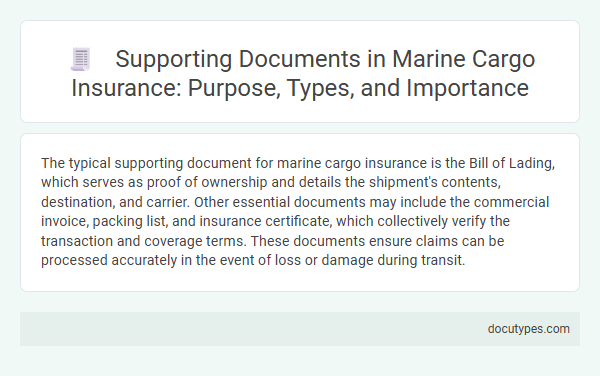The typical supporting document for marine cargo insurance is the Bill of Lading, which serves as proof of ownership and details the shipment's contents, destination, and carrier. Other essential documents may include the commercial invoice, packing list, and insurance certificate, which collectively verify the transaction and coverage terms. These documents ensure claims can be processed accurately in the event of loss or damage during transit.
Introduction to Supporting Documents in Marine Cargo Insurance
Marine cargo insurance requires specific supporting documents to validate and process claims effectively. These documents provide proof of shipment, ownership, and the condition of goods during transit.
The typical supporting document for marine cargo insurance is the bill of lading, which serves as evidence of the contract between the shipper and carrier. Other important documents include the commercial invoice, packing list, and insurance policy. Your insurer relies on these papers to assess damages and verify the terms of coverage accurately.
Purpose of Supporting Documents in Claims Processing
Supporting documents in marine cargo insurance are essential for verifying the details of the shipment and the extent of any loss or damage. Typical documents include the bill of lading, commercial invoice, packing list, and survey reports.
These documents serve to substantiate your claim and facilitate accurate assessment by the insurer. They help ensure that claims processing is efficient, transparent, and based on reliable evidence.
Essential Types of Supporting Documents in Marine Cargo Insurance
Typical supporting documents for marine cargo insurance include the bill of lading, commercial invoice, and packing list. These documents provide proof of ownership, shipment details, and item descriptions essential for claims processing. Other important documents may include the insurance policy, survey reports, and customs declarations to verify coverage and condition of the cargo.
Commercial Invoice: Key Role and Requirements
The commercial invoice plays a crucial role in marine cargo insurance by providing detailed information about the goods being shipped. It serves as a primary supporting document required for claim verification and risk assessment.
- Essential Details - Lists the product description, quantity, value, and terms of sale necessary for accurate insurance coverage.
- Proof of Ownership - Acts as evidence that you own the cargo and helps resolve disputes during claims processing.
- Compliance Requirement - Must meet specific insurer and international shipping standards to validate the insurance policy.
Bill of Lading: Legal Evidence in Cargo Insurance
What is the typical supporting document for marine cargo insurance claims?
The Bill of Lading serves as a vital legal evidence in marine cargo insurance. It outlines the ownership, condition, and destination of the cargo, making it essential for verifying claims and resolving disputes.
Packing List and Its Importance in Verification
The typical supporting document for marine cargo insurance is the packing list, detailing the contents, quantity, and packaging of each shipment item. A packing list plays a crucial role in verifying the insured cargo against claims by ensuring that the items shipped match the insurance coverage described. You rely on this document for accurate claim processing and to prevent disputes during the insurance verification process.
Insurance Policy or Certificate as Proof of Coverage
| Supporting Document | Description | Purpose |
|---|---|---|
| Insurance Policy | A formal contract issued by the insurer detailing the coverage terms for marine cargo risks. | Serves as the primary proof of insurance coverage, outlining the scope, limits, and exclusions. |
| Certificate of Insurance | A summary document providing evidence that marine cargo insurance coverage is in place. | Used to quickly verify coverage status during shipping and customs processes. |
Survey Report and Inspection Certificates Explained
Marine cargo insurance typically requires specific supporting documents to validate claims and assess risks. Survey reports and inspection certificates play a crucial role in providing detailed evidence of the cargo's condition and handling during transit.
- Survey Report - A detailed document prepared by an independent marine surveyor outlining the condition of the cargo at various stages of shipment.
- Inspection Certificate - Issued after thorough examination, this certificate confirms the cargo meets required standards and is free from visible damage.
- Importance in Claims - Both documents serve as essential proof for insurers to evaluate damage extent and determine claim validity under marine cargo policies.
Importance of Accurate Documentation in Marine Cargo Claims
The typical supporting document for marine cargo insurance is the Bill of Lading, which serves as proof of shipment and ownership of the goods. Other essential documents include the Commercial Invoice, Packing List, and Insurance Policy Certificate.
Accurate documentation is crucial in marine cargo claims as it ensures the validity and clarity of the claim filed. Proper records help expedite the claim process, minimize disputes, and support the insured party's right to compensation.
What Is the Typical Supporting Document for Marine Cargo Insurance? Infographic

